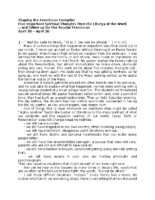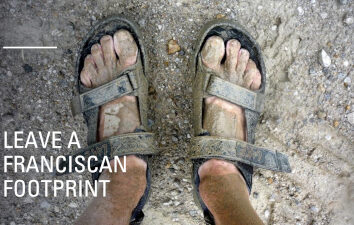Shaping the Franciscan Footprint
Five Important Spiritual Thoughts from the Liturgy of the Word
…and follow up for the Secular Franciscan
April 20 – April 26
1 — “But he said to them, “It is I. Do not be afraid.” (Jn 6:20)
Many of us have things that happened on important days that stand out in our minds. I never can go past an Easter without thinking of an Easter homily by my pastor when I was in high school on vacation from the seminary. I was serving the Mass and the homily or lack of one, really made an impression on me, as it did on everyone in the Church. My pastor started the homily talking about the Resurrection, but almost immediately he broke down, obviously crying and very moved. This went on for about five minutes, trying to talk, then breaking down again. He could see that he was getting nowhere, so he gave up, and went on with the rest of the Mass, gaining control as he spoke the familiar words of the Mass.
A number of people gathered around him after Mass to see if he was okay, and he was able to explain what had happened. He had been working with a young college student at a small college near him. The student had threatened suicide several times. My pastor had been called to him and, over a period of time, they had built up a good relationship. Then on Holy Saturday evening, the day before, the student had lost control and finally succeeded in taking his life. My pastor, as you would expect, was deeply hurt.
One of things that is clear whenever we celebrate what might be called “highly positive” feasts like Easter or Christmas is the sharp contrast of what we celebrate and the negative realities of our world. Jesus’ Birth or Resurrection does not change negative realities.
– we still have suicides;
– we still have tragedies in our own country, often involving young people;
– we still have terrorism, dangerous world situations and war;
– we still have deaths and personal heartbreaks that can make many people bitter;
– we still have the uncontrollable teenager, a spouse that does not care, parents who are old and difficult to take care of;
– we still have families in trouble, people not getting along and kids getting hurt;
– we still have people in pain who are hurting physically and psychologically.
They are negative situations that might be part of our lives right now.
And yet we hear in the Gospels so many times in Jesus’s life, words that are as often as he tells us to have faith, the words, “Do not be afraid.”
I call those difficult situations “messes.” Every family has a mess. No matter what family we are talking about, there is something that has disrupted the normal process of living. They are situations that people usually have absolutely no control over. They make people cry out, “I don’t deserve this.” “Why can’t my life be normal like everyone else’s?” “Why do these things happen to me?” They are real, and not funny in the least. They are messes, and messes “mess up” everything that is in the immediate area. No amount of soft talk or Christian celebration will ever be able to take them away.
To understand these negative realities, it is good to look at our Christian lives as sort of a spiritual battle, a battle between dwelling in the positive with the hope of eternal life as given to us in the Resurrection. Or dwelling in the negative, allowing the negative realities to dominate our lives and thinking.
The way to win the spiritual battle lies not in changing the negative facts because usually we cannot change the facts, but it lies in changing the person who encounters the facts—namely, us. One of the great spiritual truths of all times is very simply: we can change. The message of every Gospel account of the Resurrection: people changed as they understood what Jesus’ Resurrection meant. They were afraid before, but afterwards were not.
If we manage to allow Jesus’s Resurrection or Birth to dominate our thinking, it gives rise to strong positive thinking, positive thinking that looks at personal tragedies and says: yes, I can deal with these—they are opportunities to grow, to work with life and make it more positive. And, we will change ourselves, and the positive will win the battle. And be able to understand why we should not be afraid.
2 – “With that their eyes were opened and they recognized him.” (Lk 24:31)
…Have we recognized the Lord working with us, even in the difficult moments? He is.
3 — “This man never stops saying things…” (Acts 6:13)
…Stephen’s enemies saw that Stephen always spoke of the Lord. Do I speak of the Lord by my actions and words?
4 — They went forth and preached everywhere, while the Lord worked with them.” (Mk 16:20)
…As long as we do the preaching by our lives, the Lord will be with us.
5 — “I am the bread of life; whoever comes to me will never hunger, and whoever believes in me will never thirst.” (Jn 6:35)
…Do my thoughts, words and actions show that I receive the Eucharist?

